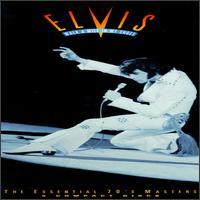
- Format: MP3

Since From Nashville to Memphis: The Essential 60's Masters gave up the ghost of being a complete overview of Elvis Presley's '60s recordings, the compilers of the companion five-disc box set Walk a Mile in My Shoes: The Essential 70's Masters — the third and final installment in RCA's justifiably acclaimed Elvis box set reissue series — decided to throw even the illusion of comprehensiveness out the window and just serve up five discs and 120 tracks of highlights. Instead of adhering to a strict chronological sequencing, which the two previous boxes did, this is divided into two discs of singles, two discs of studio highlights, then one disc that attempts to present the ultimate Elvis Presley live show by culling peaks from several gigs throughout of the decade. This is a sharp move, since there is simply too much recorded material from the '70s to be presented either completely or chronologically, and his high points are easier to digest broken down in this fashion. Truth be told, he didn't have too many outright classics during this time — just "Burning Love," "Always on My Mind," "Raised on Rock," "Promised Land," and "Moody Blue," along with 1971's excellent album Elvis Country (I'm 10,000 Years Old) — but it was a far more consistent era than the '60s, and it was more adventurous in terms of material and production, never sounding like pandering, which the early '60s could on occasion.
This is more evident on the studio highlights than on the singles discs, particularly because those two discs delve into records like Elvis Country, but the end result is a set that is far more consistent and entertaining than From Nashville to Memphis, even if it doesn't sustain the delirious heights of his late-'60s comeback. If the fifth, final live disc is the kind of thing that you listen to only once or twice, it still crackles with energy, and the two studio highlights discs prove that Presley was still a sensitive, inventive interpreter of strong material, and the productions have a rich, robust diversity that keeps this interesting and enjoyable. To say that the '70s recordings are more consistent than the '60s is true, but it does give the impression that Elvis was as consistently brilliant as he was a decade earlier. That's simply not the case — the best of the '60s recordings overshadows the best cuts here without effort — but this does have a diversity of material and sound (even if it sometimes borders on the splashy excess of Vegas) that not only keeps it interesting, it proves that, when pressed, Elvis was still restless and inventive. Maybe the music here isn't as outright classic as those on the previous box sets, but it captures its era just as well, and provides the final piece of musical narrative while serving up some terrific music. And if the final chapter of the most iconic figure in American popular music is not essential to a library, then you don't truly care for American popular music.